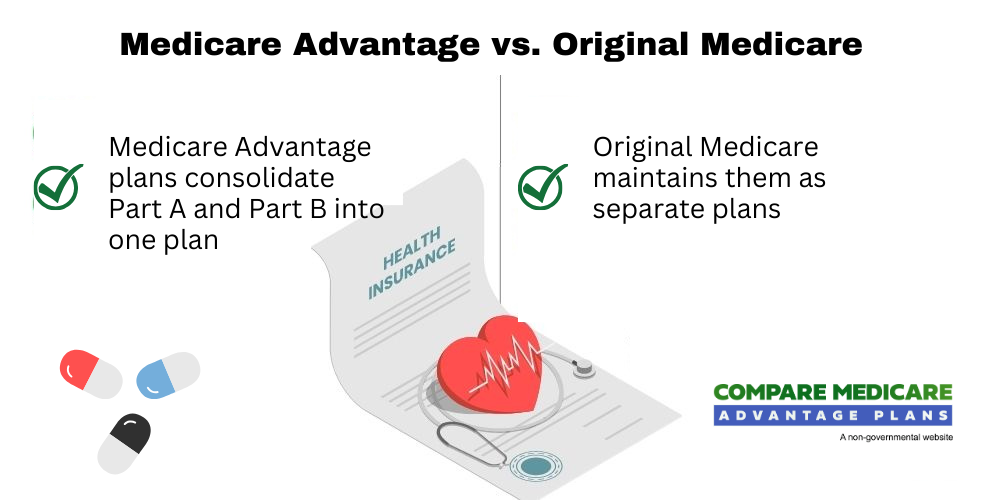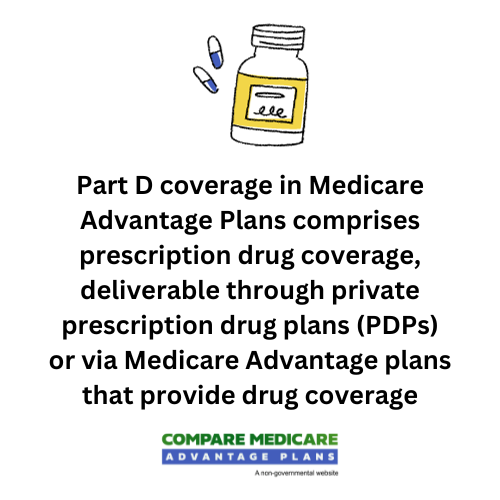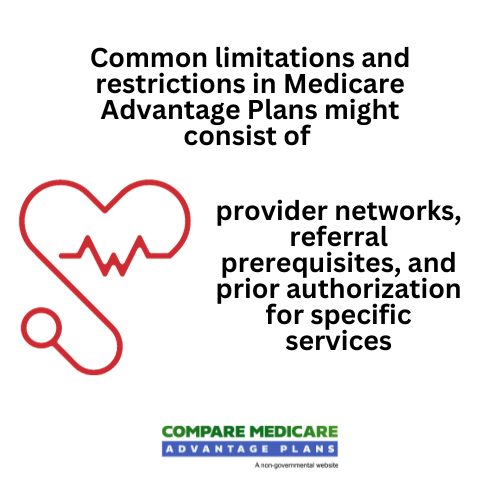Plans for Medicare Advantage
Navigating the world of healthcare might be complex, especially when it comes to choosing the right plans for Medicare Advantage. This comprehensive guide will walk you through some of the ins and outs of Medicare Advantage Plans, empowering you to make informed decisions about your healthcare coverage.
Key Takeaways
- Some Medicare Advantage Plans may offer expanded coverage compared to Original Medicare, which may include additional benefits and a range of healthcare options.
- Members may want to carefully assess their potential needs, compare the possible costs and benefits, and utilize comparison tools when selecting the right plan.
- Consider provider networks as well as potential restrictions & limitations for proper alignment with healthcare needs.
Compare Plans in One Step!
Enter Zip Code
Understanding Medicare Advantage Plans
Medicare Advantage Plans are private options that may provide supplementary coverage that could go beyond the benefits of Original Medicare, sanctioned by Medicare itself.
Some of these plans could be an alternative to Original Medicare (Part A and Part B) and may provide more comprehensive coverage, which might include prescription drug coverage (Part D). To begin the process of enrolling in a Medicare Advantage plan (also known as Part C), one must first enroll in Medicare Part A and Part B.

Original Medicare may not have an annual limit on out-of-pocket expenses. On the other hand, some of the Medicare Advantage Plans might offer this benefit. This characteristic might result in reduced expenses for beneficiaries and could offer financial safeguards against high medical bills.
Medicare Advantage vs. Original Medicare
Original Medicare encompasses Part A, which is hospital insurance, and Part B, known as medical insurance. Part A covers inpatient hospital stays, skilled nursing facility care, hospice care, and some home health care, while Part B covers doctor visits, outpatient care, preventive services, medical supplies, and emergency care. However, Original Medicare may not include coverage for prescription drugs. It’s important to note that the Part B premium could be a separate cost associated with this coverage.

Conversely, certain Medicare Advantage plans may propose a broader perspective on healthcare coverage. They include all the benefits of Original Medicare and may often provide additional benefits such as:
- Prescription drug coverage
- Vision care
- Hearing care
Certain Medicare Advantage plans may also impose varying costs and necessitate the use of a specific network of healthcare providers, as opposed to Original Medicare, which could permit visits to any provider that accepts Medicare.
Components of Medicare Advantage Plans
Some of the Medicare Advantage Plans typically provide coverage for all the hospital insurance benefits included in Medicare Part A, such as inpatient hospital care. As for medical coverage, some plans could offer an alternative to Original Medicare, which may provide medical coverage through private health insurance plans funded by the federal government.
The possibility of having prescription drug coverage in certain Medicare Advantage Plans may also include coverage for medications that could be prescribed by a healthcare provider. Apart from the standard hospital, medical, and prescription drug coverage, some Medicare Advantage Plans may also offer additional benefits such as:
- Dental care
- Vision care
Choosing the Right Medicare Advantage Plan
Choosing the suitable Medicare Advantage Plan requires consideration of multiple aspects such as:
- premiums
- deductibles
- copayments and coinsurance
- network
- prescription drug coverage
- maximum out-of-pocket expenses
Evaluating your potential healthcare needs, comparing the possible costs and benefits, and considering provider networks a necessary steps when selecting a plan.
Utilizing tools such as this website could help you compare coverage, costs, and preferred doctors and hospitals. Just enter your zip code into any of the zip code boxes on this website.
Assessing Your Healthcare Needs
While choosing a Medicare Advantage Plan, assessing your present and prospective medical requirements, including prescription medications and specialist care, is imperative. Consult with your primary care physician to discuss your healthcare needs and whether a specialist may be necessary.
Confirming that your desired healthcare providers and specialists may be a part of the plan’s network is also a necessary step.
The role of prescription medication could be significant when assessing healthcare needs for a Medicare Advantage Plan. Since some of the Medicare Advantage Plans might include prescription drug coverage as part of their benefits, it’s important to ensure that the plan you choose can cover the medications you require to manage your health conditions and enhance your overall well-being.
Comparing Potential Costs and Benefits
When comparing the possible costs and benefits of various Medicare Advantage Plans, members may want to consider the potential:
- Premiums
- Deductibles
- Copayments
- Out-of-pocket maximums
- Coverage
- Network
- Additional benefits
- Prescription drug coverage
- Quality ratings
Comparing these aspects could help you choose a plan that may offer the greatest value and align with your healthcare needs.
Considering Provider Networks
A provider network in Medicare Advantage Plans will likely be a collective of healthcare providers, like doctors, hospitals, and other care providers, who have consented to offer services to plan members at agreed-upon rates.

Some Medicare Advantage plans may often establish limited networks of covered providers, meaning that one may have to select healthcare providers within the network and may have limited access to providers outside of the network.
Availing services from certain out-of-network providers may lead to escalated out-of-pocket expenses or even denial of coverage for the services rendered, thus reviewing the plan’s network and coverage policies is critical. Confirming the potential inclusion of your preferred providers in the plan’s network could aid in circumventing possible constraints and limitations.
Enrollment Periods for Medicare Advantage Plans
Medicare Advantage Plans provide three enrollment periods: the Initial Enrollment Period, Annual Election Period, and Special Enrollment Periods. Understanding these enrollment periods and their respective timelines is vital to ensure you can enroll or modify your plan as required.
 You can enroll in a Medicare Advantage Plan during the Initial Enrollment Period, which is a 7-month window around your 65th birthday or when you initially qualify for Medicare.
You can enroll in a Medicare Advantage Plan during the Initial Enrollment Period, which is a 7-month window around your 65th birthday or when you initially qualify for Medicare.
The Annual Election Period, taking place from October 15 to December 7 every year permits beneficiaries to modify or enroll in a Medicare Advantage Plan.
Special Enrollment Periods, activated by particular life events like relocation or loss of employer-sponsored coverage, offer a chance to enroll in or switch plans beyond the regular enrollment periods.
To enroll, call 1-833-641-4938 (TTY 711), Mon-Fri 8 am-9 pm EST. Our licensed agents can provide comprehensive information, personalized guidance, and ongoing assistance to navigate the enrollment process for private insurance companies, making it easier for beneficiaries to make informed decisions about their healthcare.
Initial Enrollment Period
The Initial Enrollment Period is a seven-month window that begins three months before your 65th birthday, includes the month of your birthday, and ends three months after your birthday. During this period, you have the option to enroll in a Medicare Advantage Plan, and missing this window may result in a late enrollment penalty.
There exist exceptions to the initial enrollment period for Medicare Advantage Plans, like qualifying life events that initiate Special Enrollment Periods (SEPs). Examples of common qualifying events include loss of current coverage, relocation to a new area, or becoming eligible for Medicaid.
Annual Election Period
The Annual Election Period for Medicare Advantage Plans runs from October 15th to December 7th each year. During this period, individuals have the opportunity to modify their Medicare Advantage plans, including switching to a different plan or enrolling in a new plan.
To modify your Medicare Advantage Plan during the Annual Election Period, you can consult one of our licensed agents for help. This period is crucial for reviewing your current plan to evaluate if it aligns with your healthcare needs or to seek a new plan that better fits your requirements.
Special Enrollment Periods
Special Enrollment Periods (SEPs) are initiated by certain life events, like relocation or termination of employer coverage. These periods provide an opportunity to enroll in or change Medicare Advantage Plans outside of the regular enrollment periods.
The special enrollment period for Medicare Advantage Plans usually extends for two months post the cessation of coverage.
Being cognizant of the life events that can activate Special Enrollment Periods and their respective timelines is important to ensure you can enroll or modify your plan as needed.
Prescription Drug Coverage in Medicare Advantage Plans
Prescription drug coverage in certain Medicare Advantage Plans may be included as Part D coverage, which will likely be a voluntary outpatient prescription drug benefit for people with Medicare, that may be provided by private plans that contract with Medicare.
Some of these plans could provide coverage for medicines prescribed by a healthcare provider.
Comprehending the potential prescription drug coverage in certain Medicare Advantage Plans may be vital since it could considerably influence your healthcare costs and overall health. Several elements could affect the cost of prescription drug coverage in these plans, such as the specific plan, the category of drugs covered, and the stage of coverage.
Understanding Part D Coverage
 Part D coverage in some of the Medicare Advantage Plans that may include prescription drug coverage, deliverable through private prescription drug plans (PDPs) or via Medicare Advantage plans may provide drug coverage.
Part D coverage in some of the Medicare Advantage Plans that may include prescription drug coverage, deliverable through private prescription drug plans (PDPs) or via Medicare Advantage plans may provide drug coverage.
Part D plans will likely be mandated to cover all drugs in six protected classes, such as immunosuppressants, antidepressants, antipsychotics, and others.
The coverage available from different Part D plans that may be included in some of the Medicare Advantage may differ in terms of premiums, possible benefits, and prescription drug coverage. Each plan might have unique formularies, cost-sharing needs, and coverage limits, thus it’s important to scrutinize the details of each plan to understand the distinct coverage it provides.
Comparing Prescription Drug Plans
When contrasting prescription drug plans with certain Medicare Advantage Plans, you may want to consider the medications you consume, the plan’s formulary, and the expenses that may be linked to each plan.
The formulary may vary among various Medicare Advantage prescription drug plans in terms of the medications covered, the tier placement of those medications, and the cost-sharing requirements for each tier.
The most effective method to identify which Medicare Advantage prescription drug plan could include the medications you require is to use the ‘Medicare Plan Finder’ tool.
This tool allows you to enter your medications and compare different plans to determine which one covers your medications.
Navigating the Potential Cost Sharing Amounts and Premiums
Navigating the potential cost-sharing amounts and premiums will likely necessitate comprehending the diverse costs that could be linked to Medicare Advantage Plans and contrasting premiums. Some Medicare Advantage Plans may involve:
- Premiums
- Deductibles
- Copayments
- Coinsurance
Contemplating the monthly expense of each plan and balancing it against the potential benefits and coverage offered could allow you to make a decision that optimally meets your healthcare needs and budget.
Understanding Cost Sharing
Cost-sharing will likely comprise deductibles, copayments, and coinsurance, which may differ among plans and could affect your out-of-pocket expenses. The higher the cost-sharing amounts, the more you may need to pay out of pocket for covered services.
Comparing the potential cost-sharing amounts of various plans might be necessary to determine the most cost-effective option for you. Understanding different cost-sharing structures could enable you to make a decision that best aligns with your healthcare needs and budget.
Comparing Possible Premiums
To compare premiums, consider some of the following factors:
- The monthly expense of each plan
- The benefits and coverage that might be offered
- The health status and healthcare usage
- The potential costs of supplemental coverage and its premiums
By balancing these possible factors, you could make an informed decision about which plan is best for you to lower costs.
You could also input your zip code into any of the zip code boxes anywhere on this website to:
- Compare different Medicare Advantage and Prescription Drug Plans
- Focus on drug coverage and costs to find the perfect fit for your healthcare needs
- Input your information and sort through a variety of plans
- Weigh the pros and cons of each based on your situation
Common Limitations and Restrictions

Some of the common limitations and restrictions in certain Medicare Advantage Plans might consist of provider networks, referral prerequisites, and prior authorization for specific services.
For example, some Medicare Advantage plans may establish limited networks of covered providers, meaning that one may have to select healthcare providers within the network and may have limited access to providers outside of the network.
Being cognizant of these potential limitations and restrictions while selecting a Medicare Advantage Plan could be vital to sidestep potential complications and ensure the plan aligns with your healthcare needs.
Understanding some of the common limitations and restrictions might enable you to make a decision that optimally aligns with your healthcare needs and budget.
Potential Benefits Offered by Medicare Advantage Plans
Some of the supplementary benefits that may be provided by certain Medicare Advantage Plans could encompass covered services such as:
- Dental coverage
- Vision coverage
- Hearing coverage
Some of these plans could offer broader coverage than Original Medicare and various Medicare coverage options. Some plans may also include prescription drug coverage.
Such supplementary benefits could significantly enrich your healthcare experience and overall health. Understanding the diverse benefits that may be offered by certain Medicare Advantage Plans could allow you to make a decision that optimally suits your healthcare needs and budget.
Summary
Understanding the potential Medicare Advantage Plans could be essential for making informed decisions about your healthcare coverage. By considering possible factors such as healthcare needs, costs, provider networks, and enrollment periods, you can choose the plan that best meets your needs.
Don’t forget to take advantage of the possible benefits that may be offered by certain Medicare Advantage Plans, such as dental, vision, and hearing services, to ensure a comprehensive healthcare experience.
Frequently Asked Questions
→ What are 4 types of Medicare Advantage plans?
Medicare Advantage Plans include Health Maintenance Organization (HMO) plans, Preferred Provider Organization (PPO) plans, Private Fee-for-Service (PFFS) plans, and Special Needs plans (SNPs).
→ Why are people choosing Medicare Advantage plans?
People might choose Medicare Advantage plans due to the lack of denial rates and quick payments from insurers.
→ What is the biggest advantage of Medicare Advantage?
The biggest advantage of Medicare Advantage might be the broad range of choices for providers and health care services, which may require prior authorization and may also provide coverage for those living far away from home.
→ What are the key differences between Original Medicare and Medicare Advantage Plans?
Original Medicare provides coverage for hospital stays, doctor visits, and other medical services while Medicare Advantage Plans may offer comprehensive coverage that might include prescription drug coverage and additional benefits such as dental, vision, and hearing care.
→ When can I enroll in a Medicare Advantage Plan?
You can enroll in a Medicare Advantage Plan during the Initial Enrollment Period, Annual Election Period, or Special Enrollment Period.

ZRN Health & Financial Services, LLC, a Texas limited liability company
Russell Noga is the CEO of ZRN Health & Financial Services, and head content editor of several Medicare insurance online publications. He has over 15 years of experience as a licensed Medicare insurance broker helping Medicare beneficiaries learn about Medicare, Medicare Advantage Plans, Medigap insurance, and Medicare Part D prescription drug plans.




